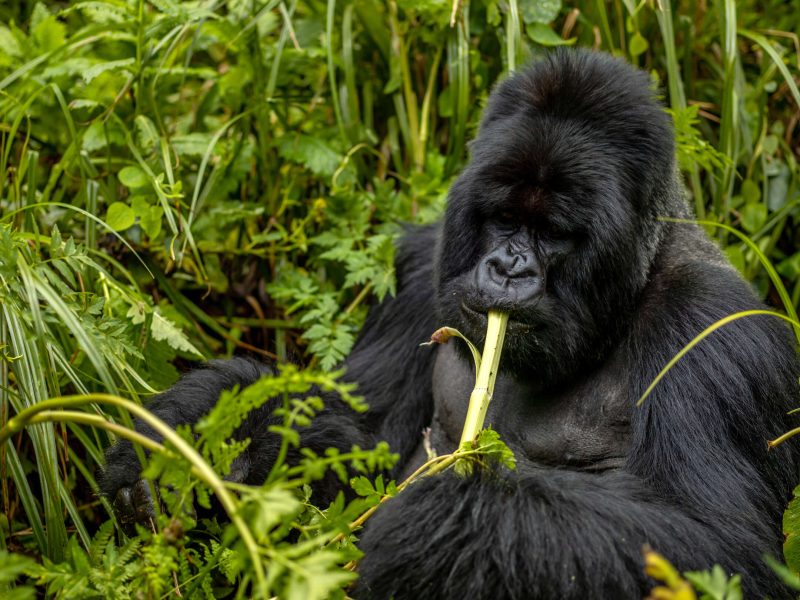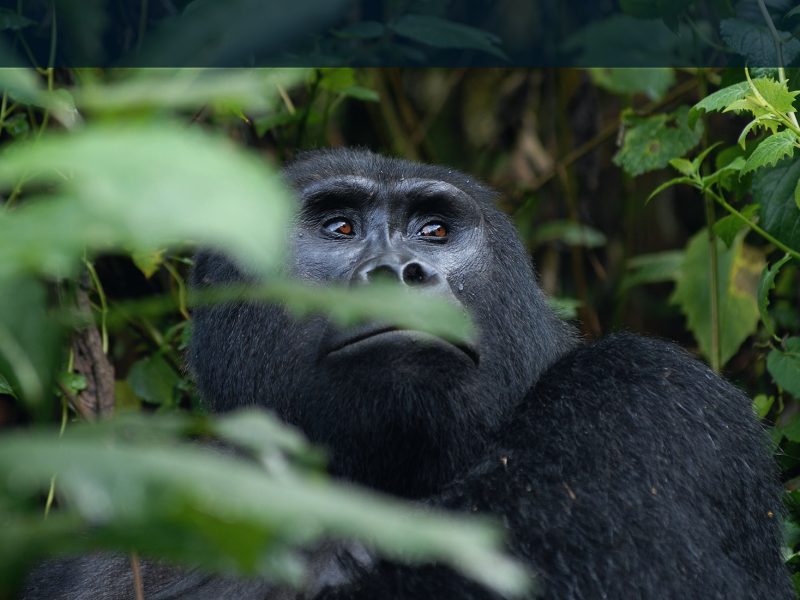Primate Watching Safaris Rules and Regulations- Rwanda Safaris
Primate Watching Safaris are common in Uganda, Rwanda and Democratic republic of Congo and Rwanda Safaris do offer ultimate Safari adventures to enjoy Mountain Gorilla Trekking , Chimpanzee watching , Golden monkey watching and primate Trekking. Get the best offer for your Rwanda Safari with us.
Observing wild primates can be a thrilling and rewarding experience, but it’s essential to take precautions to ensure the safety of both yourself and the animals. Whether you’re on a guided wildlife tour or embarking on a self-guided adventure, following these precautions will help minimize your impact on the primates and their environment while maximizing your enjoyment of the experience.
 Respect their space: One of the most important precautions when observing wild primates is to maintain a respectful distance. Approaching too closely can cause stress to the animals and may provoke defensive behaviors. Always follow the guidance of your guides or park rangers regarding the appropriate distance to maintain.
Respect their space: One of the most important precautions when observing wild primates is to maintain a respectful distance. Approaching too closely can cause stress to the animals and may provoke defensive behaviors. Always follow the guidance of your guides or park rangers regarding the appropriate distance to maintain.
Stay quiet and calm: Loud noises and sudden movements can startle primates and disrupt their natural behaviour. When observing them, try to remain quiet and calm to avoid causing unnecessary stress. Turn off cell phones and other electronic devices that could make noise.
Avoid direct eye contact: In many primate species, direct eye contact is interpreted as a threat or a sign of aggression. To avoid alarming the animals, avoid making prolonged eye contact and instead maintain a relaxed posture while observing them.
Do not feed the primates: Feeding wild primates can have serious consequences for their health and behaviour. Human food is often unhealthy for them and can lead to malnutrition or digestive problems. Additionally, feeding can habituate primates to human presence, leading to increased aggression and reliance on handouts.
 Do not touch the primates: While it may be tempting to reach out and touch a wild primate, physical contact should be strictly avoided. Not only can touching transmit diseases between humans and primates, but it can also disrupt their social structure and natural behaviours.
Do not touch the primates: While it may be tempting to reach out and touch a wild primate, physical contact should be strictly avoided. Not only can touching transmit diseases between humans and primates, but it can also disrupt their social structure and natural behaviours.
Follow Park regulations: When visiting national parks or wildlife reserves, familiarize yourself with the rules and regulations governing primate observation. These regulations are in place to protect both the animals and their habitats, and violating them can result in fines or other penalties.
Stay on designated trails: When hiking or trekking in areas inhabited by primates, stick to designated trails and pathways to minimize your impact on the environment. Straying off-trail can trample vegetation, disturb nesting sites, and disrupt wildlife habitats.
Practice responsible photography: If you’re photographing wild primates, use a telephoto lens to capture close-up shots from a distance. Avoid using flash photography, as it can startle the animals and interfere with their natural behaviours. Be mindful of your surroundings and avoid blocking the paths of other visitors or impeding the movement of the primates.
Be prepared for unpredictable behaviour: Wild primates are unpredictable, and their behaviour can change rapidly in response to various stimuli. Be prepared to adapt to their movements and behaviours, and always maintain a safe distance to avoid getting caught in the middle of any conflicts or disturbances.
Dispose of waste properly: Carry out all trash and waste from the observation site to prevent littering and pollution. Even biodegradable items like fruit peels can disrupt the natural ecosystem and attract unwanted pests.
Educate yourself about the species: Before embarking on a primate observation excursion, take the time to learn about the species you’ll be encountering, including their behaviors, social structure, and conservation status. This knowledge will enhance your appreciation for the animals and help you better understand their needs and vulnerabilities.
Be patient and respectful: Observing wild primates requires patience and respect for their natural rhythms and behaviours. Avoid rushing or pressuring the animals to perform for your benefit, and instead allow them to go about their daily lives undisturbed.
How close can you get while on Primate Watching Safari
In East Africa, particularly in countries like Kenya, Tanzania, Rwanda, and Uganda, there are several opportunities to get close to wild primates and wildlife. Here are some points and explanations regarding this:
National Parks and Reserves:
East Africa is renowned for its extensive network of national parks and reserves, such as the Serengeti National Park and Maasai Mara National Reserve. These protected areas offer guided safaris where visitors can get remarkably close to a wide variety of wildlife, including primates like chimpanzees and gorillas.
Gorilla and Chimpanzee Trekking:
Rwanda and Uganda are particularly famous for gorilla trekking experiences in the Virunga Mountains and Bwindi Impenetrable Forest respectively. Similarly, chimpanzee trekking is popular in places like Kibale Forest National Park in Uganda. These guided treks allow visitors to observe primates in their natural habitat at a close but safe distance.
Mountain Hiking:
East Africa boasts several mountains and highlands, including Mount Kilimanjaro in Tanzania and the Rwenzori Mountains in Uganda. While hiking these mountains, travellers may encounter various wildlife species, including primates such as colobus monkeys and baboons, especially in the lower altitude regions.
Community-based Tourism:
Many local communities adjacent to national parks and reserves in East Africa have initiated community-based tourism projects. These initiatives often include guided walks or cultural experiences where visitors can learn about local flora and fauna, sometimes including encounters with primates living in the area.
 Primate Rehabilitation Centres:
Primate Rehabilitation Centres:
There are primate rehabilitation centres scattered across East Africa, such as the Jane Goodall Institute’s Chimp Eden in Uganda. These centres offer educational experiences where visitors can learn about primate conservation efforts and sometimes observe primates up close while ensuring their well-being.
Bird watching and Wildlife Viewing:
East Africa is a paradise for birdwatchers, with numerous species found in diverse habitats. Many national parks and reserves offer birdwatching safaris, providing opportunities to observe primates and other wildlife while enjoying the rich avian diversity of the region.
River Safaris:
River safaris, particularly in places like Tanzania’s Selous Game Reserve or Kenya’s Lake Naivasha, offer unique opportunities to encounter wildlife, including primates like monkeys and hippos, from a different perspective.
Ethical Wildlife Encounters:
It’s essential to prioritize ethical wildlife encounters and choose reputable tour operators or guides who prioritize animal welfare and environmental conservation. Respectful behaviour and adherence to guidelines ensure that visitors can get close to wildlife in a responsible and sustainable manner.






